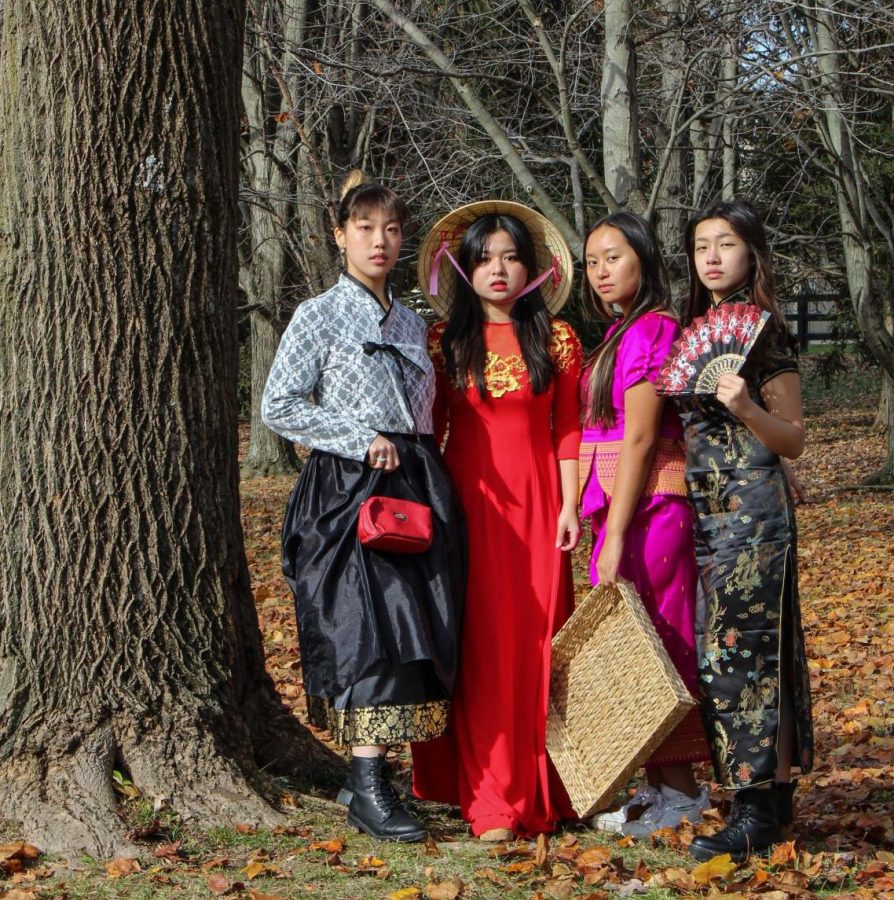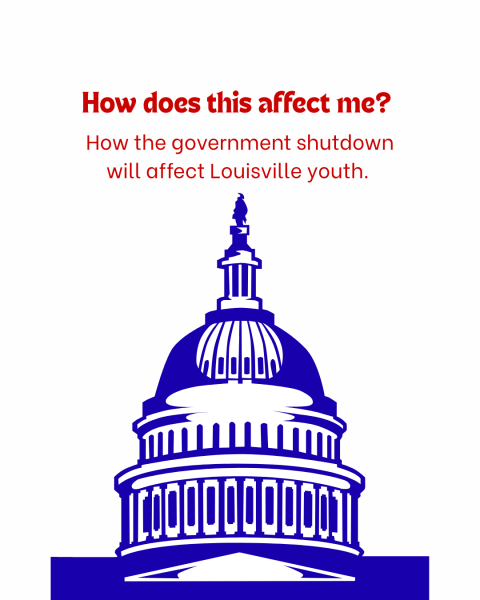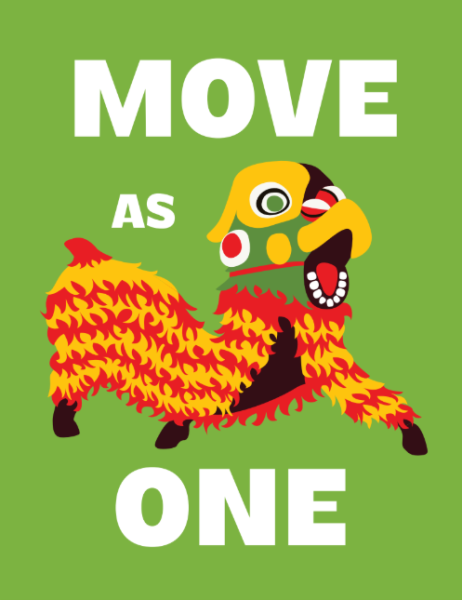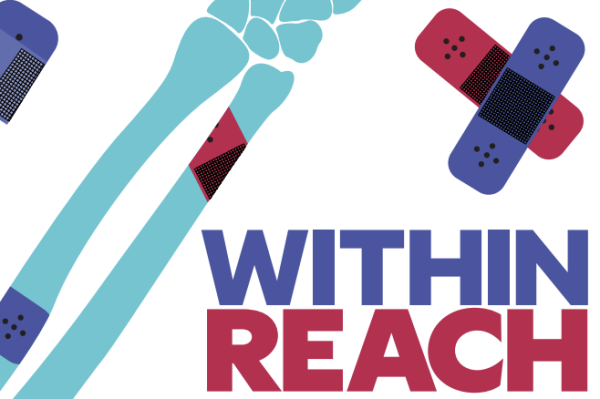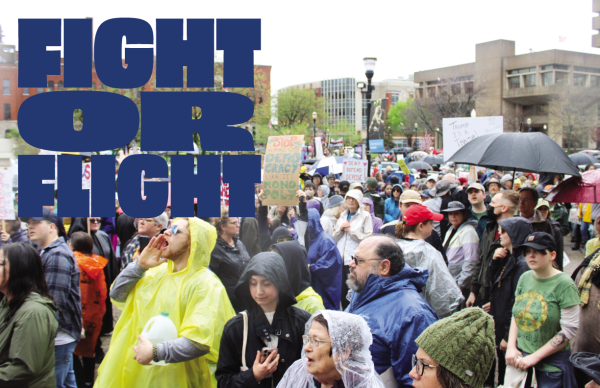Unconventionally Asian
Four Asian-American teens describe the struggle of meeting two standards of beauty.
Photos by Erica Fields
Sarah Kim, a 17 year old senior at Fern Creek High, Lin Trần, a 15 year old sophomore at duPont Manual High School, Thalia Thach, a 17 year old senior at North Oldham High School, Emily (Mimi) Cowherd, a 16 year old sophomore at Eastern High School, gather with items representative of their cultural background on Nov. 24th at Tom Sawyer Park. Sarah showcases the traditional Korean hanbok, Lin has on her Áo dài, “long shirt”, Thalia Thach wears her traditional Khmer dress, and Mimi in her qipao. Photo by Erica Barnes.
MIMI COWHERD – Chinese-American, 16
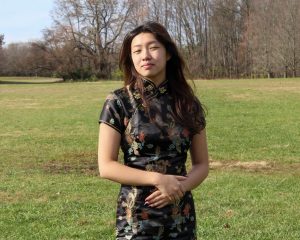
“你的眼睛真小。” (Your eyes are so small.)
“In America, I feel like I can’t embrace my features because both sides— Asians and Asian Americans— want big eyes, slim noses, small faces, and double eyelids, but I just don’t fit into any of those… I despised looking in the mirror growing up. I tried to change my eye shape and make them bigger. I would try to make another fold in my eyelid. I tried to make my nose smaller, and my head slimmer.”
When discussing K-Pop music and the genre’s place on the world stage, Mimi lit up with excitement.
“Finally representation! Because of the fact that in the media, most of the Asians were always portrayed as nerdy — the “fresh off the boat” kind of thing — and these people were dancing and breaking records, I just thought it was so cool. I feel like that’s the point in my life where I finally did not want to fit into the white stereotype and I didn’t want to “be white” anymore, I was glad I’m Asian.”
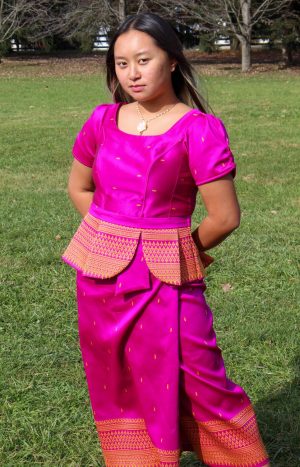
THALIA THACH – Cambodian-American, 17
“ស្បែករបស់អ្នកងងឹតណាស់។” (Your skin is so dark.)
“There are people who have come up to me in America and have been like, ‘Oh my God, you’re so tan. It’s so wonderful. I wish I was like you.’ Well, in Asia, the beauty standard is to be pale, so I’ve said, ‘No, I wish I was like you, because your skin is so good and ideal and nice. It’s fair. It’s not splotchy like mine.’”
“Don’t let people control you, be who you are. Don’t let anyone control you. Because in the long run, you’re going to be better than them. You don’t need to stereotype, you don’t need to force yourself to be someone else.”
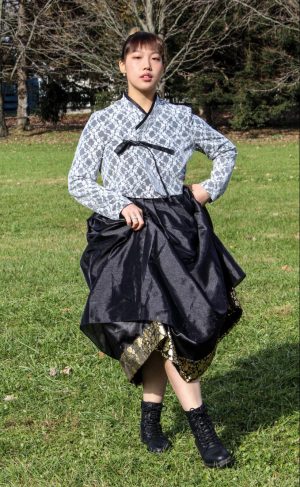
SARAH KIM – Korean-American, 17
“코끼리 다리” (You have elephant thighs.)
“As I was younger, I was told that I was beautiful. But then growing up to be on the bigger side, it felt really weird because all the Asians around me were always skinny, and somehow that translated to me that that’s how all Asians are supposed to be. ‘They’re always skinny, they’re thin, they’re good at math. Am I not Asian? I’m supposed to be Asian. Why am I not fitting into this mold?’”
“In the end, just embrace who you are. Look at yourself for that ethnicity and don’t resent yourself and feel like it’s a burden to you.”
LIN TRAN – Vietnamese-American, 15
“Vậy bạn là gì?” (So what are you?)
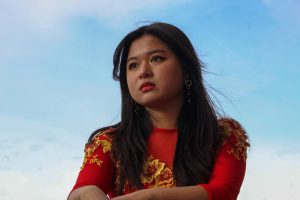
In fourth grade, my answer was, “I don’t know what I am.” Believe me, I wasn’t stupid. It was never brought to my attention that I was “different” from my classmates; it was never brought to my attention that I was not white. The city of Louisville, although very diverse compared to other Kentucky cities, remains a predominantly white area. Growing up, I never saw any Asian representation, and being one of the few Asians in my school certainly did not help. I eventually began to realize I didn’t fit into white standards, nor the Asian beauty standards society has created for me. I felt lost: if I didn’t fit these standards, then who was I? What was I?
To answer the question, I am a Vietnamese girl born in Louisville, Kentucky. I am a proud Vietnamese-American. White people tend to push these unrealistic standards on Asians— not from ill intent, but simply because they are uneducated. Neither side of me makes me less of the other, and just because I don’t fit into these unrealistic standards, doesn’t mean I’m neither Asian nor American. Not all Asians will look the same, and not all Asians will struggle with the same issues. From East and Southeast Asians to Central and Western Asians, we all have our own individualistic beauty that makes us who we are. We are unconventionally Asian.
Donations are collected through The Publishers, duPont Manual High School's booster club for J&C. On The Record relies completely on sponsorships, advertisements, and donations to produce and distribute each issue. Please consider donating to our cause, and helping the student journalists of OTR amplify youth voices for years to come.
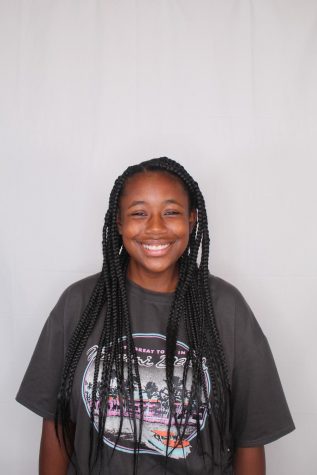
Erica Fields is senior Photo Editor for On the Record. She has a passion for telling comprehensive and compelling stories through photography and dreams...


